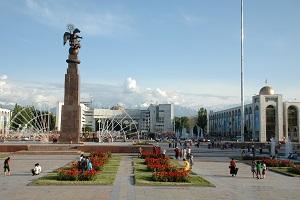The trade disruptions caused by the COVID-19 pandemic shook the Kyrgyz economy, which fell by 8.6 per cent in 2020 - for the first time in 26 years, according to the National Statistics Committee of the Kyrgyz Republic. As the country continues its efforts to “build back better”, it is imperative that the recovery is sustainable, inclusive and resilient. Trade facilitation reforms can contribute to this process. But such a recovery also requires increased capacity of policymakers and private sector stakeholders to implement trade facilitation instruments.
To help build the capacity of the local stakeholders, the United Nations Economic Commission for Europe (UNECE) signed a Memorandum of Understanding (MoU) with the M. Ryskulbekov Kyrgyz Economic University (KEU) for the period of May 2021 – April 2022. This MoU includes a UNECE grant to the KEU in trade facilitation to support the long-term development of trade facilitation experts in the Kyrgyz Republic, who will develop and implement appropriate trade facilitation measures in the country. The Kyrgyz Republic identified 56 measures of the World Trade Organization’s Trade Facilitation Agreement (WTO TFA) as category C, which means that their implementation will require support from donors. By developing the required expertise, this UNECE project is a concrete contribution to the successful implementation of the WTO TFA in the Kyrgyz Republic.
Under this grant, the KEU with UNECE support will develop training courses on trade facilitation on a number of topics including:
-
Supply chain management;
-
WTO TFA and the role of National Trade Facilitation Committees;
-
Facilitation of import and export procedures;
-
Single window implementation;
-
Intra- and extra-regional cross-border trade;
-
Cross-border e-commerce.
The courses will be based on recommendations, e-business standards and guidelines developed by the United Nations Centre for Trade Facilitation and Electronic Business (UN/CEFACT) and resources from other international organizations, and will give particular attention to local practices, regulations and private sector needs.
Once developed under the grant, the courses will be carried out by the KEU’s newly- established Center for Trade Facilitation. The courses will be integrated into the university’s curriculum for students and will be available to policymakers, business representatives and any interested parties from both the Kyrgyz Republic and other countries in Central Asia. This will contribute to the sustainable and long-term impact of the grant to build capacity of the Kyrgyz Republic and potentially the subregion in trade facilitation.
The grant activities will further include three training seminars and one roundtable for participants from the Kyrgyz Republic, transition economies in Central Asia and the Russian Federation. The activities will also include communication and outreach activities to promote the courses and activities of the KEU. This grant is part of the UNECE project "Strengthening the capacity of the Kyrgyzstan National Trade Facilitation Council to implement the WTO Trade Facilitation Agreement".
The activities under the MoU will be developed in collaboration with the Ministry of Economy and Finance of the Kyrgyz Republic. The activities will also contribute towards UNECE’s support to strengthen trade facilitation and electronic business, and trade-related economic cooperation in the UNECE region and beyond.


